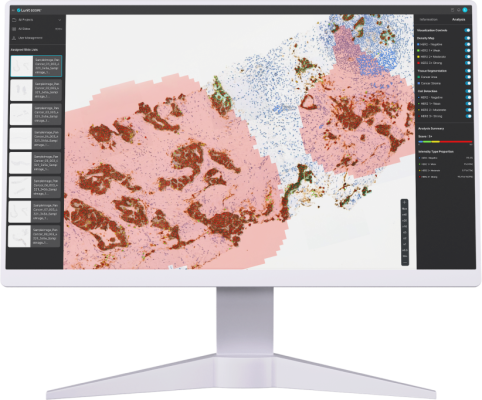
Lunit SCOPE HER2 — Lunit's AI-powered solution designed to detect HER2 expression profile (Courtesy of Lunit)
Jan. 23, 2025 — Lunit, a provider of AI-powered solutions for cancer diagnostics and therapeutics, has published a new study in the Journal of Clinical Oncology Precision Oncology. Conducted in collaboration with Japan’s National Cancer Center Hospital East (NCCHE), the study reveals how Lunit’s AI-powered pathology solutions, Lunit SCOPE HER2 and Lunit SCOPE IO, significantly improve HER2 biomarker evaluation and the prediction of clinical outcomes in metastatic colorectal cancer (mCRC) patients undergoing HER2-targeted therapy.
This study presents findings from the TRIUMPH phase II clinical trial, which evaluated 30 patients with HER2-positive metastatic colorectal cancer treated with dual HER2-targeted therapy using Trastuzumab and Pertuzumab. Lunit’s AI solutions were applied to assess HER2 status and tumor microenvironment (TME) variables, with significant findings:
Enhanced HER2 Assessment Accuracy
Lunit SCOPE HER2 demonstrated 86.7% accuracy compared to pathologist assessments for HER2 immunohistochemistry (IHC), achieving 100% accuracy in identifying HER2 IHC 3+ cases.
Improved Prediction of Treatment Response and Outcomes
Patients identified by the AI model as having a high proportion of HER2 IHC 3+ staining tumor cells (AI-H3-high, >50%) exhibited better clinical outcomes than those identified through traditional HER2 evaluation methods:
· Objective Response Rate (ORR): 42.1% (AI-H3-high) vs. 26.7% (overall TRIUMPH trial)
· Progression-Free Survival (PFS): 4.4 months (AI-H3-high) vs. 1.4 months (AI-H3-low)
· Overall Survival (OS): 16.5 months (AI-H3-high) vs. 4.1 months (AI-H3-low)
Deeper Insights into the Tumor Microenvironment (TME)
Using Lunit SCOPE IO, the study performed detailed TME profiling, including lymphocyte, macrophage, and fibroblast densities. Among AI-H3-high patients, those with low stromal TME density (TME-low) achieved the most favorable outcomes:
· ORR: 57.1%
· PFS: 5.6 months
· OS: 26.0 months
The findings underscore the transformative potential of AI-powered pathology tools in precision oncology. By providing a more accurate and detailed evaluation of HER2 status and TME characteristics, Lunit’s solutions can better stratify patients and predict responses to HER2-targeted therapies currently available or in development. This capability may inform more tailored treatment strategies, ultimately improving patient outcomes in mCRC and potentially other HER2-amplified cancers.
“This study underscores the potential of AI technology to redefine how we evaluate biomarkers and predict treatment responses,” said Dr. Takayuki Yoshino of the National Cancer Center Hospital East, principal investigator of the research. “The ability to more precisely stratify patients will lead to more personalized treatment options, improving outcomes for patients with HER2-positive metastatic colorectal cancer.”
“The findings from this study demonstrate how Lunit’s AI-powered solutions, Lunit SCOPE HER2 and Lunit SCOPE IO, can provide clinicians with actionable insights to refine treatment strategies,” said Brandon Suh, CEO of Lunit. “Our continued collaboration with NCCHE showcases the transformative potential of AI in precision oncology.”
For more information, please visit lunit.io.


 February 13, 2026
February 13, 2026 









